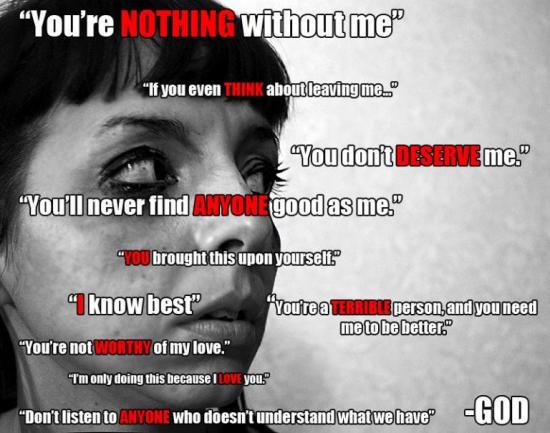Hi and welcome back! We’ve got a quick little segue ahead of us. A recent thread in comments reminded me that we’re coming up on the holiday season. And you know what that means! No, I’m not talking about Christmas trees and blowout Thanksgiving dinners. Instead, I’m talking about the other near-constant around this time of year: control-hungry, abusive Christians flinging ‘Christian love’ around to gaslight their victims! ‘Christian love’ might be a joke all year round, but it’s a very real — and very unwanted — guest at way many holiday get-togethers. Today, I’ll show you what gaslighting is, how ‘Christian love’ works as a gaslighting tactic, and some suggestions for standing strong against it.

Gaslighting 101.
If it were just a thankful hashtag, sure. But many of us are getting the full onslaught of #givethanks—beyond social media—from our Mo[rmon] families as a means of proselytizing/reactivating. I’m gonna bitch about that thx.
Gaslighting is a subtle but devastating control tactic used by abusers to gain power over their victims. To make it work, they assert something that isn’t true, something their victims know isn’t true, as though it really were true (or the opposite: they assert something their victims know is a lie as the utter truth). When the victims push back, the abusers try to make them feel like they’re crazy, unstable, or can’t properly remember what really happened.
The goal of gaslighting is to make its victims feel like their own version of reality can’t be trusted. From there, victims adopt and operate by the abuser’s modified version of reality. Once the abusers have put a new reality into place, victims will find it very difficult to resist future abuse. They’ll find it even more difficult to escape the abusers.
Even after escaping, gaslighting victims often have a lot of trouble figuring out and trusting their own memories, judgments, decisions, and insights. They’re just so used to having reality dictated to them that they don’t trust themselves to figure out what it is anymore.
That’s not even the end of the damage done. For potentially years, abusers questioned and negated their victims’ discernment, so it can be hard for those victims later to trust their loved ones with observations, criticisms, and feedback.
And my oh my, authoritarian Christians love gaslighting. They love it like burning, and deploy it whenever they possibly can.
‘Christian Love’ as Opposed to Real Love.
From start to finish, Christian love is just a way for TRUE CHRISTIANS™ to gaslight victims.
If Christian love was supposed to operate like real love, it wouldn’t need a qualifier. But it’s not at all like real love, so it does.
Even Christians should know that there’s something wrong with Christian love. I mean, jeez, their Bibles tell them exactly what real love should look like — in 1 Corinthians 13, which they call the Love Chapter in the Bible. Christians all read along with this chapter at weddings, and then they completely forget about it on the way home.
Still, it’s one of the few decent parts of the entire book. Here’s a bit of it:
Love is patient, love is kind. It does not envy, it does not boast, it is not proud. It does not dishonor others, it is not self-seeking, it is not easily angered, it keeps no record of wrongs. Love does not delight in evil but rejoices with the truth. It always protects, always trusts, always hopes, always perseveres. Love never fails.
If Christians could actually behave themselves in a way that evokes these few verses, nobody’d ever have a problem with them.
But they’ve never been able to do that. Ever. And especially not lately, in these days of their waning cultural dominance.
A God Made in Their Own Image.
I can see why authoritarian Christians have so much trouble remembering even the existence of the Love Chapter.
Their flavor of Christianity is built from stone blocks made of control-lust and abuse. These blocks form walls around their hearts. In turn, those walls stop them from noticing all the ways that reality contradicts their beliefs.
Within their walls, everything seems so real!
Their imaginary friend demands love from them — or he will torture them forever and ever. Yes, of course! They must adore him or else. What else ya gonna do? That’s even one of their official rules! They can grovel to escape his wrath with most of their rules, but not that one.
And if they don’t passionately and completely love this unthinkable monster, then he will do things to them that would make death itself seem like sweet release — if they could only escape that way.

His followers chirp and warble nonstop about loving the fiend who threatens them, their beloved spouses, and even their children with the fate described above. Not only that, but they seek to persuade other people to adopt his worship.
From that foundation, we get a god-figure who despises humanity, feels threatened by our advances, hates our ability to judge good and evil on our own, and seeks to shackle and limit us at every opportunity. It would take a truly captured mind to consider this god-figure good at all, much less loving.
So yes. The gaslighting begins with the very foundations of Christianity. Abuse and control are built into it from the very start. That’s why it cannot be rescued or recast into something truly good. Its bricks are dead stone. Such a system can’t grow or learn or change, any more than its imaginary god ever could.
Really, it’s simply a macabre mockery that one of the writers of the New Testament even dares to boast about Christianity having a better foundation than any other faith. I couldn’t create a worse one if I deliberately tried.
And neither can those trapped in that system. They must always think evil is good, wrong is right, and hatred is love. Worse, some of ’em like it that way.
‘Christian Love’ as Gaslighting.
As I read the Gospels, I see people drawing near to Jesus (Luke 15:1). [. . .] All of them are loved. And none walk away wanting to kill themselves.
— Preston Sprinkle, People to be Loved
Instead of showing real love, control-hungry Christians cloak their cruelty, condemnation, and control-lust in simpering Jesus-language, then hitch their eyebrows up super-high and close together to signify how very sincere they are. Once they’ve speared their victim, they insist immediately that nobody’s allowed to be upset or angry with them because they spoke in love.
And they did! It’s just that it was Christian love, not real love. It wasn’t real at all.
But to millions of Christians (and those suffering still with indoctrination), these stabs can cut deep. They learned as toddlers that love sometimes left victims feeling profoundly unloved — less-than — inferior — judged and found wanting — condemned.
Real love doesn’t do that.
Only Christian love does. Sometimes, Christians themselves notice this fact.
Sometimes they even feel a bit troubled by it briefly, as Preston Sprinkle did in his book People to be Loved.
(Oh, and don’t worry about our pal Preston, by the way! He decided to drill down harder on his tribe’s redefined vision of fake love. Whew! Disaster averted.)
The Truth About Love.
Love makes people feel good. It makes them feel worthy, cherished, adored, comforted, and understood. Even when someone has to deliver bad news or correction, those results don’t change.
Christian love makes people feel the opposite. That’s because it’s not actually about the other person at all. No, this kind of fake love is allllllllll about the Christians showing it: their pleasure, their need to feel superior and smug at others’ expense, all that awful stuff they crave.
(Knowing this about such Christians, I have to laugh when I encounter their cruel comments about non-Christians not knowing what love is or how to express it. It’s one of the biggest gaslighting attempts of all, this attempted dehumanization. Of course, the attempt alone utterly disproves every one of their claims about their religion and god. Just see it for what it is: a desperate attempt to take power over others. Authoritarians always grab for any and all potential sources of power. They can’t refrain, for various reasons.)
When someone says they’re acting in love but the other person feels denigrated or ill-used, it can be hugely confusing. But hold fast to that which is true.
Love is good. It doesn’t make people feel bad. It delivers strength and joy, not misery and hopelessness.
An expression of love that leaves its recipient miserable is not real.
Recognizing Christian Love.
The Christian concept of love is not like the world’s. It’s deeper, more relational, more demanding, more generous, more sacrificial, more time-consuming, more of a blessing, more helpful, less sexual and much, much less reciprocal. In short, it’s how God loves us as Christians.
— A typical load of self-serving lies from
an authoritarian Christian parroting the party line
Our human spirits know very well when someone inflicts injustice upon us. So we usually know by our gnawing discontent when an expression of love is not actual love.
Indeed, authoritarian flavors of Christianity tend to evolve social systems that specifically allow abusers to inflict pain on others without fear of pushback or repercussions. They’ve been at it for a long, long time.
Sometimes, we don’t even know exactly what’s wrong. If we grew up indoctrinated, we probably won’t recognize the gaslighting involved here for a long time. Maybe our gaslighters don’t even recognize exactly what they’re doing, or even perceive the power dynamics they’re seeking to manipulate.
After all, this is one lie that authoritarian Christians absorbed with glee many centuries ago. Christian love, as a concept, might even represent one of their very biggest and earliest lies.
Responding to Christian Love.
The boldness of the church’s hypocrisy is causing me to question the very foundation of my spiritual beliefs. It’s disorienting. [. . .] I often feel like I’m losing my sanity while the entire house of cards that is my evangelical upbringing collapses around me.
— HuffPo
When Christians themselves even recognize this kind of manipulation, they tend to offer the worst possible advice in response. For example, Christianity.com offers a list of response suggestions that begins with ensuring that gaslighting victims remain locked in their broken systems, then ends with a demand for victims to forgive their abusers. As I read this list, I found myself leaning further and further back in my chair, mouth and eyes getting progressively wider in horror.
I cringe to imagine how poorly recovery will progress if any victims try to follow such advice.
Luckily, lots of info is available for responding to gaslighting in considerably saner, healthier ways.
- Vox.com has a good post on the topic.
- I liked this British site’s writeup of religious gaslighting tactics. Valerie Tarico wrote it (and I adore her work). A lot of the entries on her list are familiar blahblah responses from Christians trying their best to rationalize their god’s purely evil nature.
- This was kinda snarky, but may contain suggestions some folks might find useful.
- Here’s a good checklist of signs, along with strategies for dealing with habitual gaslighters in your life.
- This one’s more relationship-oriented.
The Road Gets Easier, Eventually.
A lot of us are still kinda new at this whole apostasy thing. If you find yourself struggling with gaslighting, with finding your voice, with rejecting control-grabs, please know this:
Trust yourself. Trust your sense of justice and fairness. Maybe that’s easier said than done now.
Oh, please believe me here, though.
As you grow and progress, you’ll get stronger. You will no longer build vulnerable walls using fortress bricks of dead stone that wall you off, limit your growth, and finally just shatter if any attack hits a weak spot hard enough.
No, you’ll start building your opinions and decisions on what’s real and true, not pie-in-the-sky promises, imaginary threats, and the desires of invisible wizards. Your voice will gain strength with every use, while your stride lengthens with every first step you take.
That growth will become your walls: living garden walls of intertwined branches that embrace you and enfold you in all-over strength and flexibility.
One day as you’re traveling along that road, you’ll notice that it isn’t nearly as easy as it used to be for gaslighters to unhinge your entire sense of reality.
That day, you will feel bulletproof.
My dearest friends, that day is coming as surely as your successful roll to disbelieve eventually happened. There’s no way it can’t get here, not as long as you’re doing your best to learn and grow. As many of us look forward to Thanksgiving tomorrow as a time to reflect on happy memories and to enjoy the company of loved ones, even if it’s all done in virtual space, know this above all things:
That day is coming.
NEXT UP: A Thanksgiving built of memories of love. See you tomorrow!
Please Support What I Do!
Come join us on Facebook, Tumblr, Pinterest, and Twitter!(Also Instagram, where I mostly post cat pictures.)
Also please check out our Graceful Atheist podcast interview!
If you like what you see, I gratefully welcome your support. Please consider becoming one of my monthly patrons via Patreon with Roll to Disbelieve for as little as $1/month! My PayPal is [email protected] (that’s an underscore in there) for one-time tips.
You can also support this blog at no extra cost to yourself by beginning your Amazon shopping trips with my affiliate link — and, of course, by liking and sharing my posts on social media!
This blog exists because of readers’ support, and I appreciate every single bit of it. Thank you. <3















